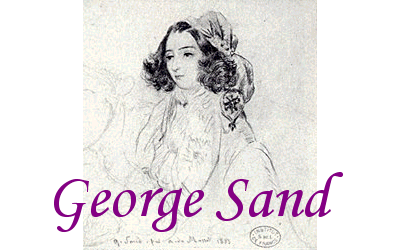

:"Will any method of persuasion reach those who are set against the truth? What goes on in their minds? Tell me, lord, that I may learn to understand them. What appeal can be made to minds protected from truth by an iron wall of prejudice? Are there men who cannot forsake their errors? Is there an age beyond which the mind cannot change? Base and cowardly natures instinctively hate truth and justice. That we know and accept. But what are we to think of human nature when we meet noble minds which are open to truth on many sides, and see them close before a phase of truth which offends their prejudice?"
George Sand, 1840 Journal Entry (Sand 112)
George Sand was already the most famous of the women writers in France when Louise Colet emerged on the scene. It was only natural for Colet to admire her, and, as Colet herself grew in stature, for Sand to keep an eye on Colet's career. But from the first time Colet tried to contact Sand, she was rebuffed most harshly. There were many commonalities between Sand and Colet's political views at the time: both were feminists working against the oppression of women in French society. However, some of Colet's views on the revolution were simply too extreme for her older contemporary to stomach.
More ironic was Sand's objection to Colet's moral character, as Sand was far from a docile woman herself. Sand was known for her many scandalous antics, from cross dressing to cigar smoking, and indiscreete romances with lovers male and female alike. One such lover was the poet Alfred de Musset, and it is from Musset's accounce of this romance that Colet creates much of the story of Lui
When Musset and Sand first met in 1833, he was 10 years her junior, and inexperienced in comparison. Sand pursued their relationship most aggresively, but there was one concern ever present in her mind: Musset's apparent "madness" (Jack 224). Musset's mental instability was always a problem as their relationship developed. In March of 1834, the tempestuous relationship came to an end, but speculation about it would continue for years.
Aside from being the subject of Colet's Lui, the affair was also the subject of several other works, including one by George Sand herself, entitled Elle et Lui.
